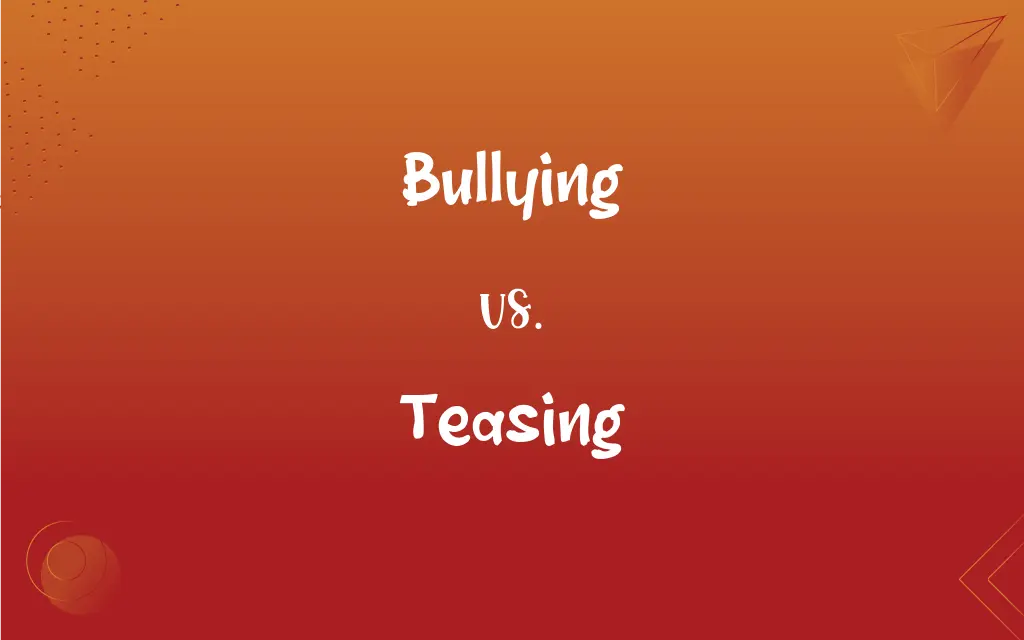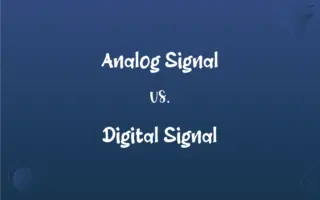Bullying vs. Teasing: What's the Difference?
Edited by Aimie Carlson || By Harlon Moss || Updated on October 24, 2023
Bullying involves repeated, intentional harm, while teasing can be light-hearted, sporadic jests without malicious intent.

Key Differences
Bullying is a behavior marked by the intention to hurt, intimidate, or humiliate someone, often repeatedly over time. Teasing, on the other hand, can be playful or friendly banter, although it can sometimes hurt feelings unintentionally.
While bullying frequently involves a power imbalance, making the victim feel powerless, teasing is often between equals and might be part of a friendly interaction, without lasting harm intended.
Bullying can manifest in various forms such as verbal, physical, social, or cyber aggression. Teasing, while typically verbal, is usually short-lived and may even be affectionate or humorous in nature.
It's important to note that repeated teasing, especially if it targets personal traits or is relentless, can border on bullying. Both can have psychological impacts, but bullying's effects are often more profound and long-lasting.
While both bullying and teasing can cause distress, the consistent and malicious nature of bullying distinguishes it. Teasing, in contrast, might be a fleeting episode without intent to genuinely harm.
ADVERTISEMENT
Comparison Chart
Intent
Intention to harm or dominate
Often light-hearted without malicious intent
Frequency
Repeated over time
Can be sporadic and short-lived
Power Dynamics
Involves a power imbalance
Typically between equals
Potential Impact
Can have profound, long-term psychological effects
May cause momentary distress but often without lasting harm
Nature
Aggressive and malicious
Can be playful, affectionate, or humorous
ADVERTISEMENT
Bullying and Teasing Definitions
Bullying
A repeated pattern of harmful actions towards someone.
Bullying can lead to severe emotional trauma for victims.
Teasing
A light-hearted jest or playful taunt.
Sarah was teasing her brother about his new haircut.
Bullying
Behavior that degrades, belittles, or isolates an individual.
Workplace bullying can manifest as constant criticism or exclusion.
Teasing
Making fun of someone in a good-natured manner.
The friends were teasing each other about their childhood memories.
Bullying
A repeated aggressive behavior intended to hurt another person.
The students reported the bullying incidents to the school counselor.
Teasing
Briefly poking fun at someone without intending harm.
The playful teasing at the party kept everyone laughing.
Bullying
An act where one uses power to intimidate or dominate another.
Cyber bullying has become a major concern with the rise of social media.
Teasing
A friendly or affectionate way of joking.
Teasing is common among close friends and siblings.
Bullying
Acts committed with the purpose of causing fear or distress.
Schools are implementing policies to combat bullying and protect students.
Teasing
An act of making light comments or gestures to provoke or amuse.
Her teasing remarks about the movie made everyone curious.
Bullying
A person who is habitually cruel or overbearing, especially to smaller, weaker, less popular, or more vulnerable people.
Teasing
To make fun of (someone) playfully or taunt annoyingly
Was teased by my classmates for being skinny.
Teased him about driving such a fast car.
FAQs
Are the effects of bullying more severe than teasing?
Typically, bullying has profound and long-lasting effects compared to teasing.
Can bullying occur online?
Yes, online or cyber bullying is a significant concern in today's digital age.
What distinguishes bullying from teasing?
Bullying involves repeated, intentional harm, while teasing is often light-hearted without malicious intent.
Can teasing ever become bullying?
Yes, if teasing is relentless, targets personal traits, and causes distress, it can border on bullying.
Can teasing be used as a comedic tool?
Yes, comedians often use teasing as part of their humor repertoire.
Is teasing always harmless?
No, while teasing can be playful, it can sometimes hurt feelings unintentionally.
Does teasing always involve humor?
While teasing often has a humorous element, it can sometimes be done without humor and still be non-malicious.
Are there different forms of bullying?
Yes, bullying can be verbal, physical, social, or cyber.
Is teasing always verbal?
While teasing is often verbal, it can also be through actions or gestures.
What should one do if they're a victim of bullying?
Victims of bullying should seek support, document incidents, and report to relevant authorities.
Is it essential to differentiate between bullying and teasing?
Yes, understanding the distinction helps address issues appropriately, as bullying requires more urgent intervention.
Does teasing always involve two people?
Typically, teasing involves two or more individuals, but self-teasing humor is also possible.
Should one confront someone teasing them if it hurts?
If teasing causes discomfort, it's advisable to communicate feelings and set boundaries.
Can teasing be a sign of affection?
Often, teasing among close friends or family can be a sign of affection.
How can schools address bullying?
Schools can implement anti-bullying policies, raise awareness, and offer counseling.
Does bullying only happen in person?
No, bullying can occur in person, online, or through other means.
Are there interventions for bullies?
Yes, interventions aim to change bullying behaviors and instill empathy.
Can adults experience bullying?
Absolutely, bullying can occur at any age, including in workplaces or social groups.
Is bullying a global issue?
Yes, bullying is a concern worldwide, affecting people across cultures and ages.
Can teasing strengthen bonds between friends?
Yes, light-hearted teasing can often strengthen camaraderie among friends.
About Author
Written by
Harlon MossHarlon is a seasoned quality moderator and accomplished content writer for Difference Wiki. An alumnus of the prestigious University of California, he earned his degree in Computer Science. Leveraging his academic background, Harlon brings a meticulous and informed perspective to his work, ensuring content accuracy and excellence.
Edited by
Aimie CarlsonAimie Carlson, holding a master's degree in English literature, is a fervent English language enthusiast. She lends her writing talents to Difference Wiki, a prominent website that specializes in comparisons, offering readers insightful analyses that both captivate and inform.































































